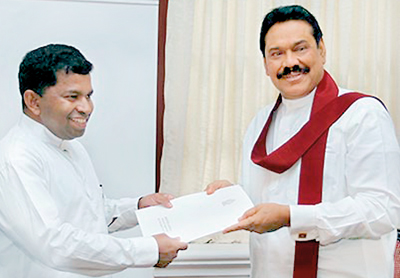News
EPC administration: A setback for ethnic reconciliation
The national discourse on ethnic relation in Sri Lanka shifted to reconciliation from conflict resolution with the crushing of the LTTE as a military force by the Sri Lankan armed forces in May 2009. More than three years after the end of the armed conflict, ethnic reconciliation still remains a distant dream. The primary reason why ethnic reconciliation did not materialise so far is that the government of Sri Lanka or the South in general and the Sri Lankan Tamil community have two fundamentally differing views about the preconditions for reconciliation.
The government, it seems, is convinced that reconstruction of roads and building bridges is the primary vehicle to bring communities together. It is also using rehabilitation of the captured or surrendered LTTE cadres as evidence of reconciliation projects. The Tamils on the other hand refused to accept development as the primary tool for reconciliation and prefer to see it through social justice lenses.

Former Eastern Province Chief Minister Sivanesathurai Chandrakanthan alias Pillayan receiving his appointment letter as an Advisor to President Mahinda Rajapaksa.
Justice for them is a reasonable solution to their political problems. Therefore, a political solution based on the ideas of devolution of powers is fundamental for reconciliation in the minds of the Tamil people.
The government has successfully transferred the responsibility of finding a political scheme to resolve the conflict to the proposed Parliamentary Select Committee, which the Tamils see as a delaying tactic. Instead of creating goodwill, the government sponsored development projects have created fear and scepticism as they are seen as projects to undermine the predominance and influence of the Tamils in the region.
The rehabilitation of former LTTE cadres has failed to make any large scale impact on ethnic reconciliation as fate of the former rebels, from the inception, remained a marginal issue. Therefore, ethnic reconciliation, after three years, continues to pose a challenge as ethnic communities live apart from each other, psychologically.
It is against this backdrop that elections for three provincial councils were announced. The Eastern Provincial Council was dissolved about a year ahead of the schedule. In the Eastern election, although the UPFA, the governing coalition, secured more seats, it could not win an outright majority.
It needed the support of another party to form the adminstration. Eventually, with the support of the SLMC, which won seven seats, the UPFA formed the provincial administration in the Eastern Provincial Council. Najeeb A Majeed, an SLFP stalwart, a Muslim, was appointed Chief Minister of the Council. As per the 13th Amendment of the Constitution, a five-member Board of Ministers, including the Chief Minister was appointed. The Board of Ministers included four Muslims and one Sinhalese. What is striking is that the Tamil community, which forms little more than one third of the population of the province, is not represented in the provincial administration.
There may be two reasons why the Tamils were excluded completely from the provincial administration. One, the government was under pressure to accommodate all major Muslim parties that contested the election under the UPFA symbol and the Muslim Congress, which the government was dependent upon to form the administration in the East.
Two, the government probably wanted to teach the Tamils, who voted heavily with the TNA, a lesson. If the government was keen to accommodate at least one Tamil in the provincial administration, it could have done it. However, assuming that Tamils did not vote for the government could be a mistake. A substantial number of votes, former Chief Minister Chandrakanthan received should have come from the Tamil constituency. Not accommodating a Tamil in the provincial cabinet was certainly a betrayal and might in future elections further erode the Tamil support for the UPFA. This may also dilute the political standing of the pro-government Tamil parties among the Tamil people.
The Tamils in the Eastern Province have all the reason to feel alienated as they cannot depend on the generosity of other communities in a deeply divided ethno-centric polity. Sivanesathurai Chandrakanthan’s appointment as presidential advisor on Eastern affairs guarantees nothing to the Tamil people as the government may or may not listen to his counsel. It, however, will certainly ensure personal benefits to the former Chief Minister. P.K. Balachandran of the Indian Express promptly called the position a sinecure.
To pacify (or mislead) the disappointed Tamils, pro-government commentators also planted the story that Chandrakanthan will be absorbed into the Economic Development Ministry and that he will be allocated “some funds” for development activities. Now, the Tamil people will have to depend on “some funds” for their progress and welfare.
One of the reasons why ethnic Tamils are not too enthusiastic about reconciliation is that they are not convinced that the government was sincere in its efforts to address their grievances. Exclusion of the Tamils from the Eastern Provincial Council administration will reinforce this notion and facilitate further polarisation of ethnic communities in the East in particular and the country in general. The EPC election and the composition of the board of ministers of this council indicate that ethnic reconciliation in Sri Lanka will remain a distant dream for a long time to come.
(The author is Chair of the Conflict Resolution Department, Salisbury University, Maryland)
Follow @timesonlinelk
comments powered by Disqus
























